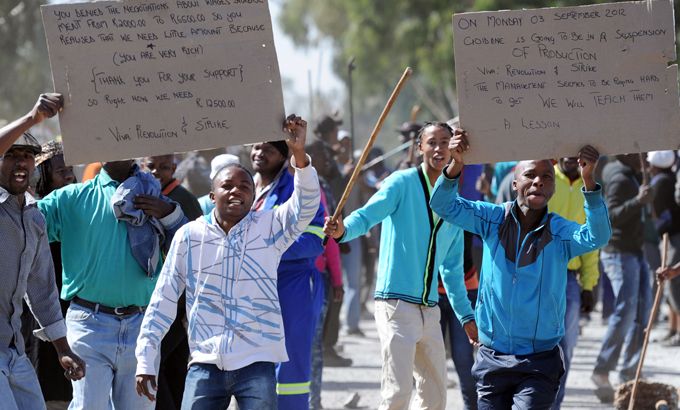Unrest spreads to South Africa gold mine
At least four people wounded after police and security guards fire at sacked miners blocking colleagues from working.

South Africa’s mining violence has spread to Johannesburg, with police and security guards firing rubber bullets and tear gas at sacked gold miners who have been blocking colleagues from working, officials and police said.
Police there have arrested 13 people in connection with the violence at the Gold One mine outside Johannesburg.
Keep reading
list of 4 itemsFacebook, Instagram face EU scrutiny over addictive effects on children
Who benefits from US tariffs on Chinese imports? Experts weigh in
Biden slaps new tariffs on Chinese imports, ratcheting trade war
According to police, four people were wounded when they were shot with rubber bullets by security guards on Monday at the mine that used to be partially owned by President Jacob Zuma’s nephew.
As the violence spreads across several mines, workers have gone on strike and threatened to halt production in all mines if salaries and living conditions are not improved.
The clash at the Gold Fields mine east of Johannesburg, reported by police and Neal Froneman, the CEO of Gold One International, which runs the mine, was the latest violence to hit South Africa’s mines in months of unrest.
Froneman said as police were called to disperse the protesting miners, they stoned a vehicle carrying people to work.
“Our security had to intervene, they used rubber bullets and police used rubber bullets and tear gas,” Froneman told the Associated Press news agency. “Four people were slightly wounded and all have been released from the hospital.”
But Pinky Tsinyane, a police spokesman, said one of those wounded was in critical condition. The different versions could not immediately be reconciled. Tsinyane also said four people were arrested for public violence.
South Africa has been rocked by mining violence since August 16 when police shot and killed 34 striking miners at Lonmin platinum mine in Marikana. The miners were demanding a 300 per cent pay rise.
Days before the fatal shooting, 10 people, including two police officers, had been killed in violence at the mine located in the North West province.
Sven Lunsche, the company spokesman, said nearly 12,000 of Gold Fields’ workers “continue to engage in an unlawful and unprotected strike” that began on Wednesday.
He said it involved an internal dispute between local union leaders and members of the National Union of Mineworkers, the country’s largest union.
After apartheid ended in 1994, South Africa pressed to share the country’s vast mineral wealth with its impoverished black majority. But the hoped-for result has not occurred.
Malema joins fray
A small black elite has grown rich while most South Africans continue to struggle against rising unemployment, abject poverty and a widening gap between rich and poor.
The mine where the violence took place on Monday has previous business ties to relatives of Nelson Mandela and Zuma – and was the site where firebrand politician Julius Malema, an avowed enemy of Zuma, pledged last week to make the nation’s mines ungovernable.
|
Journalist Greg Marinovich talks to Al Jazeera about the Marikana mine shootings |
Malema, a one-time ally of Zuma, was expelled from the governing African National Congress (ANC) this year for bringing the party into disrepute by making inflammatory comments and has called for the nationalisation of the mines.
Violence at the Lonmin mine left 112 workers injured by police gunfire, the worst post-apartheid crackdown by security agencies. Police said they opened fire in self-defence.
Outrage at the police killings was exacerbated by prosecutors, who last week charged about 270 miners arrested at the scene with the murders and attempted murders of their striking co-workers – people who were killed by police.
The National Prosecuting Authority was forced to retract on Sunday, withdrawing the charges made under an apartheid-era law.
On Monday, 91 arrested miners were released, much to the joy of their ululating and singing family members and supporters.
But there were tears for the many more who remained in custody.
The government has apologised for the violence which commentators say could hurt Zuma’s chances of re-election next year.
A judicial inquiry investigating the violence is to report to Zuma by January.